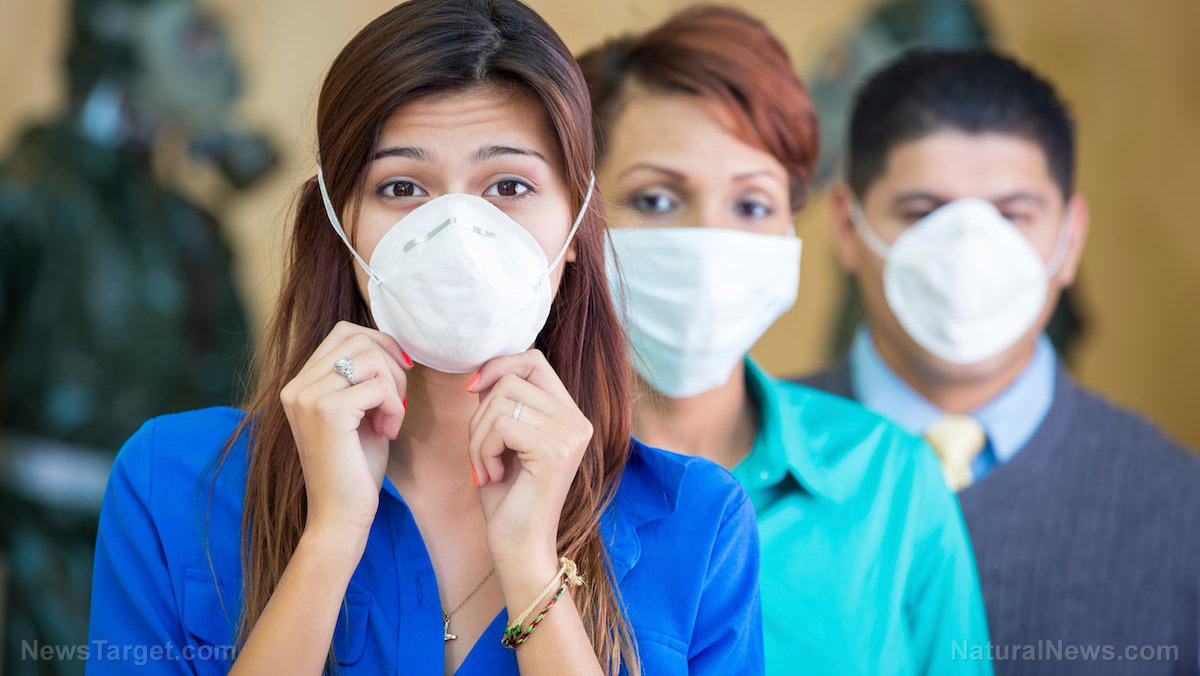Warning from “expert” – Compulsory masks, QR codes may return due to wildly-hyped omicron variant
11/30/2021 / By Matthew Davis

Compulsory masks and QR codes may be required again at all venues because of the new Wuhan coronavirus (COVID-19) variant. This is the warning issued by a leading expert following the emergence of the omicron variant from South Africa.
Catherine Bennett, chair of epidemiology at Deakin University, told Daily Mail Australia that the nation may have to become used to “dial up, dial down” controls if more cases emerge. That may involve the return of masks and QR codes in all indoor settings, including workplaces.
“Similar to what happened with [the] delta strain, we could see restrictions dialed up again as a precaution,” Bennett said. “Options could be masks in indoor settings, including offices to prevent transmission.”
She, however, doesn’t see anything more drastic. “This is what living with the virus is all about,” said Bennett.
Her warning came barely a week after the New South Wales announced masks would only be compulsory on public transport and in a few limited high risk settings once the state hits 95 percent double vaccination rate or on December 15.
QR codes will only be required for high risk venues such as pubs, small bars, registered clubs and nightclubs and for indoor music festivals.
Wearing masks in Victoria are also set to be scrapped in retail settings on December 15, but will remain mandatory at health services, aged care and public transport, and for primary school staff, visitors and students in years three to six.
Bennett agreed with the approach Australia has taken in recent days in response to the new strain. “They’re wise precautions, until we learn more,” she said. “Not pushing everyone into hotel quarantine and focusing on the travelers of the highest risk is a good thing.”

She believes that omicron may cause a more benign infection than the highly contagious delta variant, which plunged Australia’s two biggest cities into lockdown for months.
“We know most people who develop severe disease often don’t develop those symptoms until the second week of infection, but so far hospitals are not being overwhelmed and symptoms are resolving quickly,” Bennett wrote in a piece for the Sydney Morning Herald.
“On the upside, if this or future strains do out-compete delta, or whatever the dominant variant of the time is, but cause less severe disease, then we might be taking a significant step along our path to endemicity.
Omicron is spreading, say the same “authorities” that lied about everything else related to covid
The omicron variant has been detected in the U.K., Australia and Italy. Meanwhile, other nations are still investigating suspected cases of the strain which health authorities say could be more transmissible and has been driving a jump in infections in South Africa.
Two travelers who arrived in Australia from southern Africa on Saturday, November 27, were found to be infected with the variant. Both were reported as being asymptomatic and fully vaccinated.
Italy identified its first case of the omicron variant from a traveler who arrived from Mozambique, according to Italy’s National Institute of Health.
Dozens of governments around the globe have now restricted travel from South Africa and neighboring countries to try to avoid the variant’s spread.
The World Health Organization on Friday, November 26, declared omicron a “variant of concern,” indicating that it carries higher risks than other virus strains.
Health authorities in Belgium, Israel, Hong Kong and Botswana have also detected cases of the new variant.
Omicron can evade parts of immune response triggered by vaccination
In its statement Friday, the WHO didn’t mention omicron’s potential impact on the effectiveness of COVID-19 vaccines.
But several scientists have said that among omicron’s around 50 mutations – compared with the original coronavirus detected in Wuhan, China, in 2019 – there were several that allowed the virus to evade parts of the immune response triggered by vaccination.
Epidemiologists are divided on whether travel bans are an effective way to stop new variants from moving to other countries. Some have said that omicron’s early detection and South Africa’s decision to rapidly alert the world to its potential risks have given health authorities elsewhere a chance to at least slow down its spread.
Earlier Saturday, Dutch authorities confirmed that 61 of the 600 passengers that arrived from South Africa on two KLM flights tested positive for the coronavirus. Health authorities are still analyzing whether those passengers are carrying the new strain. Passengers who tested positive for COVID-19 were placed in isolation at a hotel.
In Germany, authorities in the state of Hesse, home to Frankfurt International Airport, said Saturday that they had identified several mutations present in the omicron variant in samples taken from a traveler returning from South Africa.
Follow Pandemic.news for more news and information related to the coronavirus pandemic.
Sources include:
Tagged Under: big government, covid-19, Delta Variant, infections, insanity, mask mandates, medical fascism, Medical Tyranny, omicron, outbreak, pandemic, QR code, travel bans





















